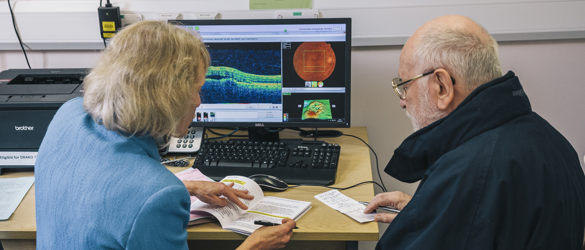
Eye tests
A regular eye examination is an important health check for everyone. You should have an eye test every two years or as often as recommended by your optician, even if you don’t have any problems with your sight.
An eye examination can often detect the early signs of many eye and general health conditions before you become aware of any symptoms. This includes glaucoma, diabetes, and raised blood pressure or cholesterol levels.
If you have a macular condition it is still important to have a regular eye examination with your optician to monitor any changes.
Will I have to pay?
You are entitled to a NHS free eye examination if you:
- are over 60 years old
- are registered severely sight impaired or sight impaired
- have diabetes or glaucoma
- are aged 40 or over and have a close relative with glaucoma
- are considered to be at risk of glaucoma by an ophthalmologist
- are under 16, or under 19 and still in full-time education
- need a prescription classed as complex lenses
- receive the following benefits: income support, income based job seekers allowance, pension credit guarantee or income-based employment and support allowance (or your partner receives them)
- are entitled to, or named on, a valid tax credit exemption certificate or a HC2 certificate
- live in Scotland.
There are restrictions on how often you can have a free eye examination. If you have more than the amount permitted you will be charged the private eye examination fee.
If you are on a low income but are not covered by any of the above categories, ask your optician or GP for a HC1 form or phone 0845 850 1166.
NHS-funded mobile eye tests
If you are housebound you may be entitled to an NHS-funded mobile sight test, where the optometrist comes to visit you:
- in your own home
- at a residential or care home
- at a day centre.
Call NHS Direct on 0845 4647 to find out the contact details for providers that cover your area.
Looking for more information about eye tests?
Call the Macular Society Helpline on 0300 3030 111 or email help@macularsociety.org
Last review date: 02 2022
What to do after diagnosis
Find advice on what to do after a diagnosis of a sight loss condition. Macular Society is here to guide you through what to do next and to help you get any support you may need.
Support for you
We provide free information and support to those with macular disease, along with their family and friends, to help people keep their independence.
Free confidential advice and support
Call our helpline on 0300 3030 111
Lines are open 9am - 5pm Monday to Friday
About the Macular Society Helpline



